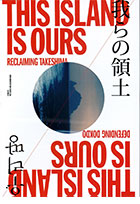
This Island Is Ours 2016, 2018 release
Distributed by Collective Eye Films, 1315 SE 20th Ave. #3, Portland OR 97214; 971-236-2056
Produced by Alexander Bukh, a Contented Production
Directed by Nils Klauss and Alexander Bukh
DVD, color, 54 min., Japanese or Korean with English subtitles
High School - General Adult
History, Political Rights, Protest Movements
Date Entered: 06/26/2018
Reviewed by Cliff Glaviano, formerly with Bowling Green State University Libraries, Bowling Green, OHDokdo (Korean) or Takeshima (Japanese) is a group of uninhabited islets in the Sea of Japan, also known as the Liancourt Rocks. Although under the administration of South Korea, the islets are also claimed by Japan and North Korea. The film chronicles the dispute between Japan and South Korea from the points of view of Korean Jaeik Choi, kindergarten caretaker and Head of the National Front of Dokdo Guardians, and Japanese citizens Mariko Kajitani, house wife and Secretary General of the Association for Protecting Prefectural Territory Takeshima, and Yasukata Suwabe, Shinto priest and Chair of the Association. Requests for a decision by the International Court of Justice (ICJ) in 1954 and 1962 proposed by Japan were rejected by South Korea. A 2012 request for hearing by the ICJ proposed by South Korea was rejected by Japan.
Since 2005, the 100th anniversary of Takeshima Day in Shimane Prefecture, Japan, Choi has led a small number of Dokdo Guardians to protest Takeshima Day each February 22nd at ceremonies in Shimane Prefecture. These protests of Japanese claims provoke name calling, pushing and shoving by the Japanese, and escalate to near riots. Kajitani’s and Suwabe’s contribution to Takeshima Day has been in its establishment in the Prefecture. Though they may participate in the ceremonies, they don’t participate in the anti-Korean counter-protest. In particular, Kajitani expresses dissatisfaction with the Japanese government for not putting Takeshima Day on the national calendar, and for not solidifying Japan’s sovereignty claim to the islets. Good interviews with Choi, Kajitani and Suwabe are interspersed with historical footage, views of the confrontations, and views of Dokdo/Takeshima to present a balanced treatment of the controversy.
This Island Is Ours is recommended, most appropriately for college coursework in Asian studies or social activism. It may be hard for viewers to place much value on an isolated group of rocks that is sporadically occupied for seal hunting, but clearly some Koreans and Japanese do. The film explicitly shows how much can be done with strong convictions and through networking on the Dokdo side. On the Takeshima side, there are interesting observations about citizen activism as opposed to radical activism in Japan.